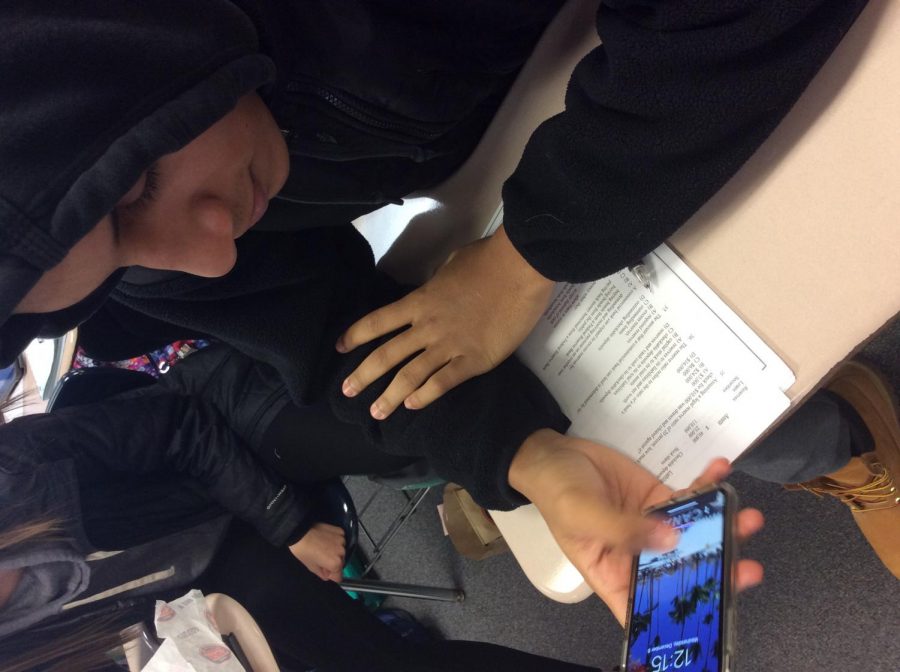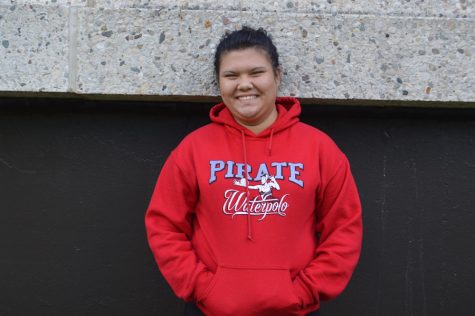New facial recognition from Apple
Senior, Lamon Barry uses the iPhone X
December 7, 2017
Never ceasing to disappoint, Apple has done it again. The globally adored company has taken their newest technology to a whole new level of stalker-esque.
Now they’ve got your face on file.
But this isn’t the first time a tiny camera has snatched a picture of your face without your knowledge. Nor is it the first time your face has been translated into a pattern of ones and zeros, and compared to an entire database of criminals.
Since the late 1980s, millions of people around the world are subject to this type of facial recognition technology every day. It’s used practically everywhere, from your local bank to the Pentagon, to prevent criminals and terrorists alike from misbehaving and endangering those around them. The only difference is that now it’s saving your life in a whole new way— you can use it to unlock your phone. Cool.
First and foremost, it’s important to understand the basis of what facial recognition technology really is and how it works.
According to World of Forensic Science, “Computerized facial recognition is based on capturing an image of a face, extracting features, comparing it to images in a database, and identifying matches.¨
Essentially, cameras all over capture pictures of faces. Then, these faces are broken down into numbers so that the computer can read it. The computer takes the proportions between different “nodes” (significant points on the human face, there are about 80) on the face, and stores the data. Following that, it compares those numbers to numbers already in its database. It can use these comparisons to recognize matches or verify an identity.
The article “Facial Recognition” from World of Forensic Science also points out some factors in the image quality including light, background, and position of the head that can affect the accuracy of the facial recognition technology. These become important if the pictures are being taken from surveillance cameras that may not catch a clear image of the person. Regardless, sometimes these individuals don’t want their faces to be captured, even if they aren’t a criminal.
“Your face is the only thing that is unique about you. It just kind of bothers me that they would have my face somewhere. Like, think if someone was looking at pictures of a bunch of people’s faces on file somewhere. That’s so weird,” Chase Friel, a sophomore at Palatine High School, said.
Facial recognition is extremely helpful in identifying people like criminals, terrorists, shoplifters, or the user of a cell phone or credit card. However, Friel is not alone. There are plenty of advocates against the technology due to its insensitivity to individual privacy. Another example is Claire Garvie from the Center on Privacy and Technology at Georgetown Law.
“The real concern is that, as face recognition becomes normalized, we may stop worrying about the very real concerns that we should be worrying about as we increasingly are subjected to face recognition that we can’t opt out of,” Garvie says in an interview with NPR’s Michel Martin.
She goes on to explain a variety of circumstances in which facial recognition technology could compromise our personal privacy and security but doesn’t point fingers at Apple itself. Garvie actually explains that Apple has taken very precautious measures to ensure that the facial data stored on their phones are secure, but rather than other methods used to capture and store similar information might not be as comforting. Facial recognition technology is used everywhere, so it’s important not to isolate it to what is one the latest iPhone, nor to neglect the potential consequences of its other uses.
“And we forget that it’s used by any number of actors in ways we may not know about that is both less accurate and more privacy concerning than the way that Apple has chosen to use it,” Garvie said.
One instance could involve someone being falsely accused of shoplifting and asked to leave a store. This would be quite embarrassing and annoying for the customer, but it may be a price well worth paying if the same technology accurately identified a terrorist before the act of terror was done.
“In certain ways, it could be seen as racist— kicking out people based on their appearance,” Viraj Desai, a sophomore at Palatine High School said.
Facial recognition could save lives, which makes it that much more necessary in the modern world full of criminals and secret identities. Being able to verify who exactly is in a specific location at a given time is an irreplaceable asset to the security of the general public. It does require a little bit of faith and acceptance of the principle, but the risk for false identification is consistently decreasing since the early developments of the technology.
“Experts say facial recognition systems can be extremely reliable. Apple claims its new iPhone has no trouble telling a real face from a photo- and can even recognize individuals if they grow a beard or don eyeglasses” NBC’s Kate Baggaley said in this article for NBC.
Resistance to facial recognition should continue to decrease as the technology improves, and it’s a minimal setback when the advantages of the product are considered.
“Soon we’ll be using our faces to pay for groceries, catch trains, pass through airport security, and more,” Baggaley said.
The convenience factor is a huge plus for individual use, and security is a vital aspect from the commercial perspective. Still, some prefer to use the increasingly popular Touch ID as opposed to the extra effort of typing in a 6-digit passcode.
“Personally I don’t like it. I feel like the fingerprint is a lot more secure. Even though you can do facial recognition on the iPhone, it still creeps me out,” Julia Plesniak, a sophomore at Palatine High School said.
Despite the overall sense of uneasiness produced by the concept of facial recognition, the technology is still indispensable to society today. The security benefits to individual businesses and the government and convenience it provides to individual citizens make the minor discomfort of the concept worth it in the end.









